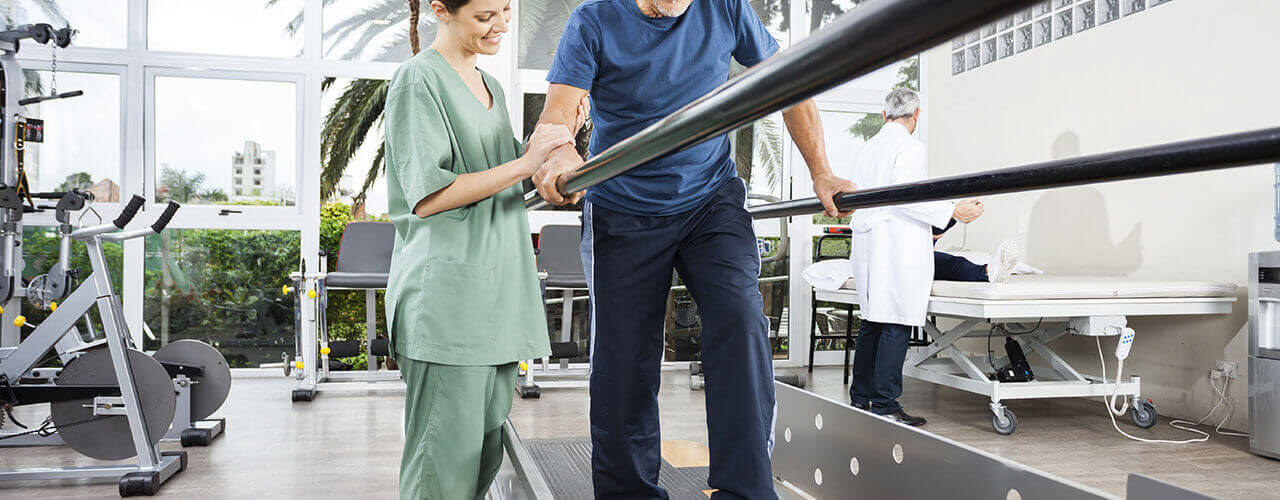Have you been suffering from inexplicable falls, unsteadiness or balance issues? Do you find yourself struggling with knee, hip, or other joint pain, due to changes in the way you stand and walk? Do you get occasional bouts of the “spins?” If so, you’re probably finding that your balance or gait disorder disrupts your life in all kinds of ways. A variety of underlying musculoskeletal and neurological disorders can cause or aggravate the development of a balance or gait problem. Fortunately, physical therapy can help you get your feet back under you safely and effectively — so contact our Shreveport physical therapy clinics today to restore some balance to your everyday life!
What are balance and gait disorders?
Balance and gait disorders belong to a family of functional problems that interfere with your positional awareness, ability to keep yourself upright, and normal means of walking or running. As described by the Mayo Clinic, a balance issue can make you feel as if everything is spinning around you or that you’re in danger of falling over, even if you are safely sitting or lying down. A gait disorder is any condition that causes you to walk or run in an abnormal, unstable manner. These two issues are closely connected — a balance disorder can cause gait problems, and Move Forward Physical Therapy notes that gait disorders cause up to 17 percent of falls in seniors.
What causes balance and gait disorders?
Balance and gait disorders can spring from very different causes. Many balance problems are related to problems in the vestibular system, a delicate collection of fluid-filled chambers and sensory nerves in the inner ear. This system is responsible for proprioception, or your sense of position. In the common condition known as benign paroxysmal positional vertigo (BPPV), calcium debris in the inner ear produces balance issues. Neurological problems such as a stroke, Parkinson’s disease, or a brain injury can all interfere with your balance. Even if your brain and nervous system are working well, muscle weakness, injury, or disease can make it all but impossible for your legs and feet to keep you upright.
Like balance disorders, gait disorders can be caused by neurological or neuromuscular ailments or injuries. Any condition that impairs nerve or muscle function may lead you to walk in an abnormal manner. But gait problems can also be caused by musculoskeletal issues such as abnormal foot arches, overuse injuries such as plantar fasciitis, or uneven muscle support that favors one side of the body over the other. An old injury that never healed properly may affect your gait if internal scar tissue limits the range of motion in a foot, knee, or hip.
How physical therapy helps balance and gait disorders
Physical therapy can provide the answers to help you with many different balance and gait disorders. The first necessary step is a comprehensive physical evaluation in which our Shreveport physical therapist studies your stance, gait, balance, and medical history, as well as any symptoms such as dizziness or discomfort. Once we know the underlying cause of your affliction, we can create a customized physical therapy plan, which may include:
- Gait retraining exercises – A faulty gait can often be corrected through retraining. The Arthritis Foundation cites a study in which participants with gait problems due to osteoarthritis successfully altered their gait through treadmill exercises.
- Vestibular rehabilitation training – This form of physical therapy can help you reconcile your vestibular system, vision, nerves, and muscles for improved balance. Special exercises can even help stabilize floating debris in the inner ear.
- Strengthening exercises – By building up the muscles that govern your gait and balance, we can help you maintain your equilibrium and make yourself less injury-prone.
- Stretches – Exercises that improve your flexibility and range of motion give you more control and enable quicker reactions to shifts in balance.
If you are ready to stop stumbling and get back to your stable everyday existence, physical therapy can throw you an anchor. Contact our Blanchard & Shreveport, LA clinics today to speak with a physical therapist!
